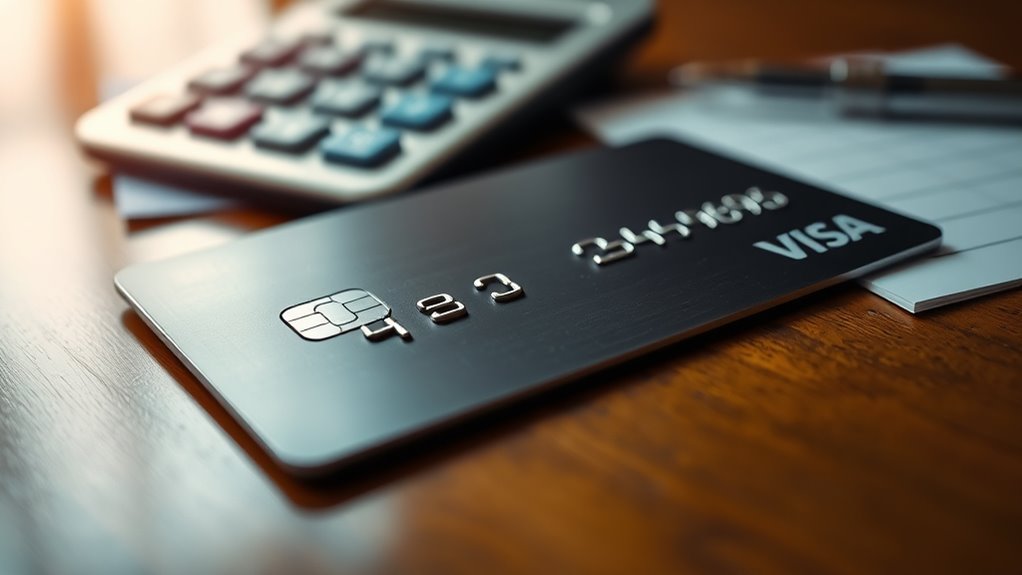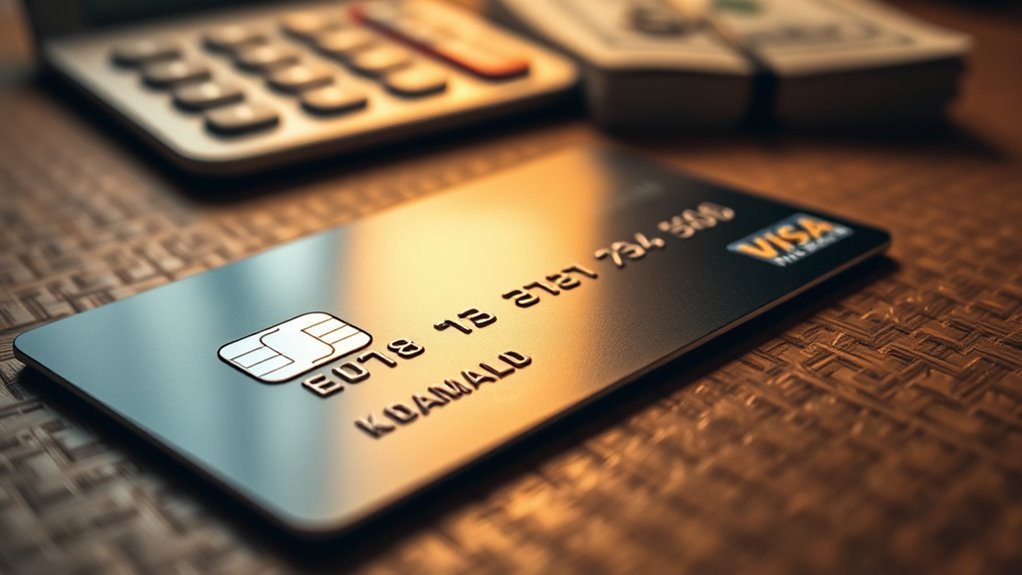When you pay only the minimum balance on your credit card, your debt takes longer to clear, and you’ll pay way more in interest over time. Minimum payments cover mostly interest and a small part of the original amount, so the principal decreases slowly. This means you keep accruing interest on the remaining balance, costing you hundreds or thousands extra. Understanding how interest adds up helps you make smarter decisions—stick around to learn how to save more.
Key Takeaways
- Making only minimum payments extends your debt payoff time and increases total interest paid over time.
- Minimum payments cover mostly interest, leaving most of the principal balance unpaid.
- Carrying a balance beyond the billing cycle accrues interest daily or monthly, raising the cost of debt.
- Paying less than the full statement balance results in interest charges on unpaid purchases.
- Consistently paying more than the minimum reduces debt faster and minimizes overall interest costs.

Have you ever wondered how credit card companies charge interest on your balances? Understanding this process can help you avoid costly mistakes and save money. When you carry a balance from month to month, the credit card issuer applies an interest rate, often called the Annual Percentage Rate (APR), to the amount you owe. This interest is calculated daily or monthly based on your outstanding balance, meaning the longer you carry a balance, the more interest accrues. One way to avoid paying interest altogether is by paying your full statement balance each month, but that’s not always realistic for everyone.
Many people consider making a balance transfer to manage their debt better. A balance transfer allows you to move your existing balance from one credit card to another, ideally with a lower interest rate or a promotional 0% APR for a set period. This can considerably reduce the amount of interest you pay during that promotional window, giving you a chance to pay down your debt faster. However, keep in mind that balance transfers often come with fees, typically around 3% to 5% of the transferred amount. If you don’t pay off the transferred balance before the promotional period ends, the regular high interest rate may kick in, making it more expensive than you initially thought.
While managing your debt is essential, many credit cards also offer cashback rewards for your spending. These rewards are a great way to get something back for your purchases, but they can also influence how you use your card. If you’re chasing cashback rewards, it’s tempting to make more purchases or carry a balance to maximize rewards, but this can lead to paying interest on those balances. Remember, if you don’t pay your statement balance in full, you’ll be charged interest on your purchases, which can quickly outweigh the benefits of earning cashback rewards. To truly benefit from cashback, always aim to pay your balance in full each month.
In both cases—whether you’re considering a balance transfer or leveraging cashback rewards—being aware of how interest is calculated and how minimum payments work is key. Making only the minimum payment might keep your account current, but it also prolongs your debt and increases the total interest paid over time. It’s better to pay more than the minimum whenever possible. By understanding how credit card interest works and being strategic with your payments and rewards, you can make smarter financial decisions and minimize the amount of interest you pay. Additionally, understanding the importance of home theatre projectors and their features can help consumers choose better electronics that suit their needs.
Frequently Asked Questions
How Is Credit Card Interest Calculated Daily or Monthly?
You’re probably wondering how credit card interest is calculated. It’s typically done daily, using your card’s daily periodic rate derived from the annual interest rate. Each day, interest fees accumulate based on your outstanding balance. Then, at the end of the billing cycle, the total interest is added to your statement. Understanding this helps you avoid excessive interest fees and manage your debt, especially since interest rates can vary.
Can Making Multiple Payments Reduce Interest Faster?
Making multiple payments can help you reduce interest faster because it increases your payment frequency, which lowers your average daily balance. This means less interest gets compounded over time. When you pay more often, you’re tackling the interest accrual more frequently, slowing down its growth and cutting down the total amount you pay. So, frequent payments can save you money by minimizing interest compounding on your credit card.
What Happens if I Miss a Minimum Payment?
Missing a minimum payment is like hitting a speed bump on your financial road. You’ll likely face late payments, which can trigger penalty rates that spike your interest costs. Plus, your credit score takes a hit, making it harder to secure better deals. To stay on course, always pay at least the minimum on time, avoiding the costly detours of late fees and penalty rate hikes.
Are There Any Fees for Paying off the Balance Early?
You usually won’t face prepayment penalties when paying off your credit card early, so you’re free to clear your balance anytime without extra fees. However, if you transferred your balance from another card, watch out for balance transfer fees, which can add to your costs. Paying early can save you interest, but always review your card’s terms to make certain no hidden fees apply.
How Does Credit Card Interest Affect My Credit Score?
Ever wonder how credit card interest impacts your credit score? It can lower your score if accumulating interest causes your balance to grow, affecting your credit utilization ratio. Missed or late payments hurt your payment history, further damaging your score. Paying off your balance in full and on time keeps your credit utilization low and demonstrates responsible credit habits, helping your score stay healthy. So, managing interest is key to maintaining good credit.
Conclusion
So, next time you make only the minimum payment, remember you’re effectively paying extra for the privilege of carrying a balance. It’s ironic how that small amount keeps you in debt longer and costs you more in interest. You might think you’re saving money, but in reality, you’re just paying more over time for the convenience of not paying in full. Sometimes, the smartest move is simply paying off your balance—before interest does it for you.









